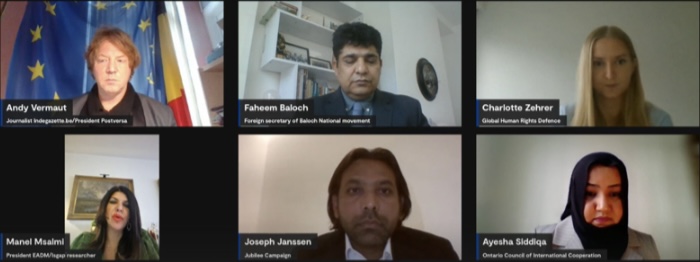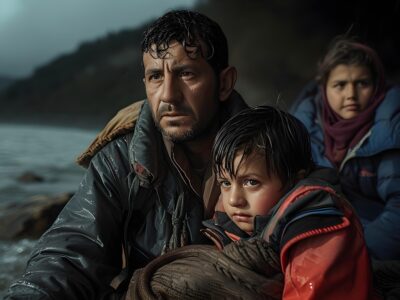
© Global Human Rights Defence, 2025.
New York City, United States
GHRD official press release
16th of April 2025
Global Human Rights Defence (GHRD) hosted its first virtual side event at the ECOSOC Youth Forum in New York on the 16th of April. The event centered around breaking barriers and advancing gender equality for women and girls in Pakistan, and hosted a variety of expert speakers. It was moderated by Manel Msalmi, President of the European Association for the Defense of Minorities, who highlighted the significance of the event, given the disastrous situation of human rights of Pakistani women and girls. Some violations, according to Manel Msalmi, include forced child marriages, forced conversions and the abuse of blasphemy laws.
The first speaker, Faheem Baloch, provided a strong opening to the discussion. Faheem Baloch serves as the Foreign Secretary of the Baloch National Movement and during this event shed light on the struggle that Baloch women face in Pakistan. State oppression, gender-discrimination and human rights abuses are a grim reality for Baloch women. Especially the practice of enforced disappearances is a prevalent human rights violation that the Baloch National Movement has been documenting for years. Faheem Baloch here highlighted the case of Dr Marang Baloch, a famous activist and Baloch human rights defender, who has been one of the average six people who disappear in Balochistan each day.
Next, Ammarah Balouch illustrated the situation of women and girls in Sindh. As UK representative of UN Women, she shared shocking insights into the reality of Sindh girls, consisting of enforced disappearances, conversions and marriage to their abductors. Often, victims of this egregious practice are minor girls. Ammarah Balouch emphasized that the patriarchal structures prevailing in Pakistan play an important role in keeping this practice alive, and ensuring impunity for perpetrators, especially in rural areas. To hear the voices of survivors, according to Ammarah Balouch, together with ensuring accountability are the most important steps that need to be taken in order to protect Sindhi women and girls in Pakistan. She therefore called for more pressure from the international community and the United Nations and for independent investigation into all cases.
Following these examples from Balochistan and Sindh, journalist and dedicated human rights activist Andy Vermaut gave a heartfelt speech about the mobilization of young people in Pakistan and beyond. According to Vermaut, more than 10,000 people have been forcibly disappeared in Pakistan since 2011. He highlighted some exemplary cases of sisters, mothers, and women human rights defenders who have all fallen victim to this human rights violation. Andy Vermaut then issued an important call for Pakistan to ratify the UN Enforced Disappearances Convention in order to bring an end to this practice and to ensure justice for its victims.
Another first-hand account was given by the head of the Jubilee Campaign, Joseph Janssen. In his touching speech, Joseph Janssen highlighted the persisting issue with wrongful blasphemy accusations in Pakistan. Given that this criminal offense mandatorily incurs the death penalty, which conflicts with standards set by international law such as the ICCPR, accusations are often falsely made with the intention to oppress and defame religious minorities in the country. A tragic incident here is the case of Joseph Janssen’s sister and her husband, who, despite being illiterate, were found guilty without any evidence or due process of having written a blasphemous message and sentenced to death. This, according to Janssen, not only constitutes a grave violation of the right to life and liberty, but also of freedom of religion for any minority group in Pakistan.
The issue of wrongful blasphemy accusation extends from Christians and Hindus to the Ahmadiyya community. Ayesha Siddiqa delivered an impactful speech on behalf of Ahmadi women in Pakistan. As women they face multiple and intersectional discrimination, even on an institutional level. Pakistan’s criminal law prohibits Ahmadis from identifying themselves as Muslim and from practicing their religion or entering places of worship. In addition to this religious discrimination women and girls face the risk of child and early marriage and of socio-economic exclusion. Ayesha Siddiqa emphasized the need to abolish discriminatory laws and to offer education and economic opportunities to Ahmadi women such as to advance their gender equality.
Lastly, Charlotte Zehrer spoke on behalf of GHRD. She presented a report published by the organization, analyzing the situation of women and girls in Pakistan from a human rights perspective. The report, according to Charlotte Zehrer, found significant gaps in their protection as well as persisting human rights violations that raise grave concerns. Next to education and economic participation which remains underdeveloped and unattainable for many women and girls, the provision of healthcare, especially reproductive and maternal healthcare, is concerningly insufficient. In addition any legal protections afforded to women and girls in Pakistan remain largely inconsistent and inadequately enforced. This means that the judicial and executive system fails to protect women and girls in accordance with Pakistan’s international legal obligations. Charlotte Zehrer also highlighted the dire situation of women and girls belonging to ethnic and religious minorities, against whom the most egregious violations continue to be committed with impunity.
All speakers at the event, in line with GHRD, called to action: The international community needs to pay much more attention to the situation of women and girls in Pakistan. Their equality is far from being achieved, and their voices remain mostly unheard. Accountability for violations needs to be ensured. Discriminatory practices must end. Mobilization and international cooperation play an important role in achieving these goals. Lasting change can only be achieved through extensive education, accountability efforts and international pressures and cooperation. Manel Msalmi ended the event with an impactful quote by Muhammad Ali Jinnah: “There are two powers in the world, the sword and the pen. But there is a third power that is even stronger than the other two: the power of women.”







Comments